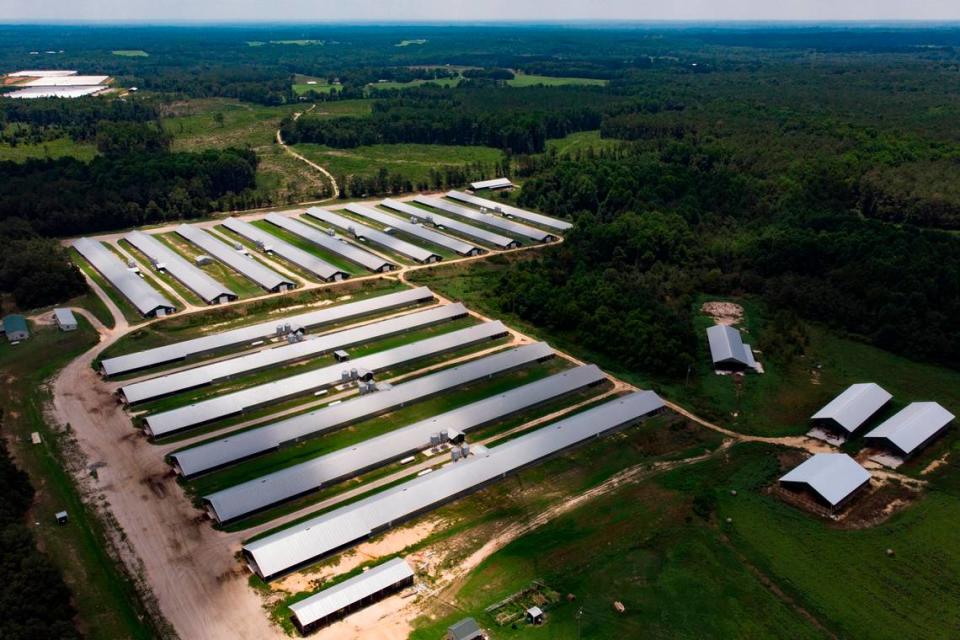NC poultry farmers complain they’re ‘slaves’ to industry. Will new federal bill help?
- Oops!Something went wrong.Please try again later.
Farmers who complain of unfair practices by the large poultry companies they depend on for their livelihoods could get more protection from federal regulators and the courts, under a U.S. Senate bill introduced last week.
The “Poultry Grower Fairness Act,” sponsored by Sen. John Fetterman, a Democrat from Pennsylvania, would direct courts to award “reasonable attorney’s fees” when poultry and livestock farmers prevail in lawsuits against the companies with whom they contract for animals and feed.
Lawyers are often reluctant to take on such cases because they can’t be sure they’ll get paid, according to Aaron Johnson, program manager for the Rural Advancement Foundation International-USA, a North Carolina-based nonprofit that advocates for farmers.
Fetterman’s legislation would make it “more viable for any poultry or livestock farmer to sue a company that is abusive to them,” said Johnson, who pushed for the reforms proposed in the bill.
“This extends a whole lot of fairness and protection to poultry farmers,” he said.
The bill could have significant implications for many farmers in North Carolina, one of the nation’s leading poultry producers.
Farmers usually raise chickens and turkeys under contract with multi-billion-dollar companies, known as integrators, that control almost all aspects of production. In North Carolina, those corporations include Tyson Foods, Perdue Farms, Butterball and other leading poultry companies.
For poultry farmers, big risks
And there’s a lot riding on the success of those contracts. When farmers get started, they typically borrow more than $1 million to build three or more barns — structures that stretch the length of two football fields and can hold 20,000 to 40,000 chickens apiece.
But an investigation by The Charlotte Observer and Raleigh News & Observer last year found that many of those farmers have little control over the things they need to succeed financially – such as the health of the chicks and the quality of the food that integrators provide.

Fetterman’s bill is designed to protect people like David Lutz, a former Lincoln County poultry farmer whose contract with Case Farms was canceled after he complained that the company was bringing him moldy feed and piles of dead chickens. Lutz sued the Troutman-based company, which ultimately agreed to pay him an undisclosed sum as part of a confidential settlement.
But the company did not cover Lutz’s attorney’s fees, he said.
Case Farms declined to comment on Lutz’s allegations. But in court filings the company denied that it supplied substandard feed and chickens.
In theory, Lutz said, Fetterman’s bill could help farmers like him. But he’s not optimistic that it will become law.
“None of this is going to happen, because the integrators are too powerful,” Lutz said Monday. “They’re not going to let this pass into a law that’s going to hurt them.”
Bob Ford, executive director of the N.C. Poultry Federation, declined to comment on the bill Monday, saying he has not yet learned much about it.
A dominant business in NC
With chicken and turkey production increasing by 33% in the past two decades — more than half of that growth coming in the past five years — poultry is North Carolina’s No. 1 agriculture business. By one measure, pounds of meat produced, North Carolina is the nation’s top chicken state.
The legislation would also enhance the ability of the U.S. Department of Agriculture to protect poultry farmers, allowing the agency to resolve complaints through administrative actions such as injunctions and temporary restraining orders. Now, when the USDA wants to stop an abusive practice by a poultry company, it must go through the U.S. Justice Department. That sharply limits the number of enforcement actions that can be taken.
Nick Gavio, Fetterman’s press secretary, said the senator will fight to pass the legislation, either as a standalone bill or as part of the upcoming Farm Bill.
”He believes that we need to do more to help our small poultry farmers and fight corporate consolidation in the agriculture business,” Gavio said in an email to the Observer.
Rudy Howell, a former Robeson County chicken farmer, said poultry growers need protections like the ones proposed by Fetterman.
When Howell worked as a contract chicken farmer for Perdue Farms several years ago, he complained that the company was delivering sickly chicks and poor quality feed to his farm. He also alleged that some company representatives were abusing chickens.
After Howell raised his concerns with a British newspaper and allowed a videographer for an animal rights group onto his farm, the company terminated its relationship with him.
Perdue officials declined to respond to questions about the company’s dealings with Howell and other farmers who’ve filed complaints. But in an emailed statement to the Observer last year, the company said it’s a leader in poultry welfare and that it values “the excellent relationships built on trust we have with our farmers, and remain committed to providing them fair, competitive contracts.”
Howell and others say the trust between farmers and integrators doesn’t always last for long.
“The poultry farmers aren’t educated when they get into this,” he said Friday. “They’re just slaves to the industry. They don’t have control over anything.
“Until the farmers realize they have a legal leg to stand on, nothing will happen.”
Big Poultry: Five takeaways from investigating North Carolina’s secretive ag industry

